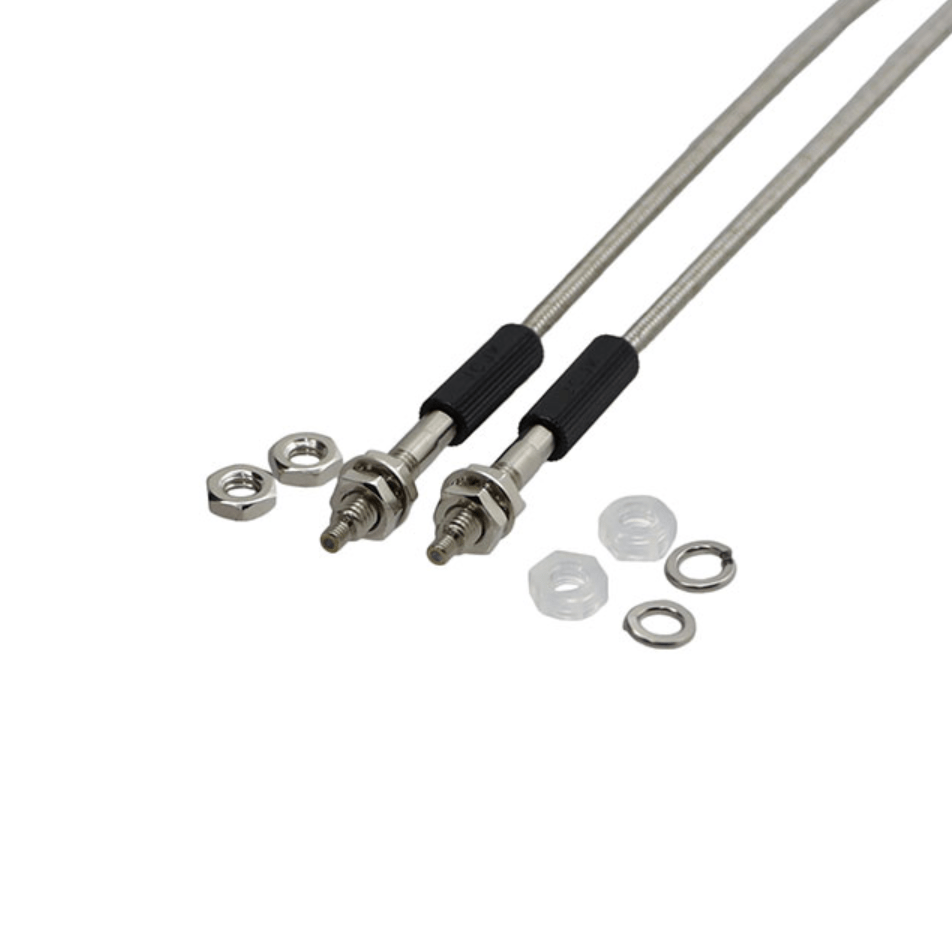Panasonic FT-H20-J20-S Heat-resistant Fiber: Robust Solution for Industrial Automation
The Panasonic FT-H20-J20-S heat-resistant fiber is a high-performance thrubeam sensor engineered for extreme high-temperature environments. With a 200mm high-temp fiber cable, M4 threaded fiber sensor head, and IP40 protection, the Panasonic FT-H20-J20-S heat-resistant fiber excels in FT-H20-J20-S industrial automation applications like FT-H20-J20-S metal processing and FT-H20-J20-S automotive manufacturing. As a heat-resistant joint fiber set paired with a 2m standard fiber, it offers flexibility and durability. Featuring RoHS compliant fiber sensor design and FX-500 series compatibility, this sensor is ideal for FT-H20-J20-S harsh environment sensor needs and narrow space fiber sensor installations.
Technical Specifications of Panasonic FT-H20-J20-S Heat-resistant Fiber
The Panasonic FT-H20-J20-S heat-resistant fiber provides robust features for high-temperature industrial applications. The following table outlines its key specifications:
| Parameter | Specification |
|---|---|
| Fiber Type | Thrubeam, heat-resistant joint set |
| Fiber Length | 200mm high-temp fiber + 2m standard fiber |
| Bending Radius | R18 (18 mm) |
| Protection Class | IP40 |
| Temperature Range | -60°C to +200°C (high-temp fiber) |
| Amplifier Compatibility | FX-500 series, FX-LE1 lens |
| Compliance | RoHS (2011/65/EU, 2015/863/EU) |
Industrial Applications and Key Features
High-Temperature Sensing in Harsh Environments
The Panasonic FT-H20-J20-S heat-resistant fiber withstands temperatures up to 200°C, making it ideal for heat-resistant fiber applications. Its rugged design supports FT-H20-J20-S metal processing, enabling reliable object detection in high-heat settings like steel forging or aluminum casting. The FT-H20-J20-S harsh environment sensor also thrives in FT-H20-J20-S automotive manufacturing, performing consistently in processes such as welding or heat treatment.
Compact Design for Narrow Spaces
The FT-H20-J20-S compact fiber sensor features an M4 threaded fiber sensor head, facilitating secure installation in confined areas. Its narrow space fiber sensor capability, combined with a 200mm high-temp fiber cable and R18 bending radius, allows flexible mounting in complex machinery. The high sensitivity fiber sensor ensures precise detection, boosting efficiency in challenging industrial environments.
Industrial Automation and System Integration
With FX-500 series compatibility and support for the FX-LE1 lens, the FT-H20-J20-S ensures seamless FT-H20-J20-S industrial automation. Optical communication enables rapid configuration of multiple amplifiers, simplifying system integration. The FT-H20-J20-S fiber optic datasheet and FT-H20-J20-S fiber optic manual, available from source, provide detailed setup guidance, optimizing performance in industrial heat-resistant sensor applications.
Installation and Maintenance
The M4 threaded fiber sensor head and heat-resistant joint fiber set streamline installation with secure mounting. The 200mm high-temp fiber cable, paired with a 2m standard fiber, offers flexibility for custom setups. Regular cleaning of the fiber head maintains the high sensitivity fiber sensor’s performance in high-temperature conditions. The FT-H20-J20-S’s durable construction reduces maintenance needs, ensuring long-term reliability.
Safety and Compliance
The FT-H20-J20-S is a RoHS compliant fiber sensor (2011/65/EU, 2015/863/EU), reflecting its environmentally responsible design. Its IP40 heat-resistant fiber rating ensures reliable operation in controlled environments. The sensor’s -60°C to +200°C temperature range makes it a versatile industrial heat-resistant sensor for diverse high-temperature applications.
Why Choose Panasonic FT-H20-J20-S Heat-resistant Fiber?
The Panasonic FT-H20-J20-S heat-resistant fiber delivers exceptional reliability for heat-resistant fiber applications. Its M4 threaded head, 200mm high-temp fiber cable, and FX-500 series compatibility make it perfect for FT-H20-J20-S metal processing and FT-H20-J20-S automotive manufacturing. The FT-H20-J20-S high temperature sensor’s compact design and high sensitivity ensure precise detection in narrow spaces and harsh environments. Access the FT-H20-J20-S fiber optic datasheet for detailed specifications and enhance your industrial automation with this robust, high-performance solution.
Visit our blog about The Importance of Sensors in Industry 4.0.
Improving Industrial Reliability with Panasonic FT-H20-J20-S
The Panasonic FT-H20-J20-S heat-resistant fiber sensor represents a new standard in industrial durability and precision. Its ability to perform reliably at temperatures up to 200°C makes it a critical component for environments where consistent detection is essential. Whether operating in metal forging lines, die-casting facilities, or automotive welding systems, this sensor ensures stable performance even under continuous thermal stress. The FT-H20-J20-S not only enhances operational efficiency but also supports long-term system stability, reducing unplanned downtimes in demanding production environments.
Advanced Engineering for Maximum Efficiency
Designed for integration into modern industrial automation systems, the FT-H20-J20-S combines advanced optical sensing with energy efficiency. Its compatibility with the FX-500 amplifier series and FX-LE1 lens ensures optimized signal transmission and rapid calibration. The compact M4 threaded sensor head provides installation flexibility in limited spaces, while the robust fiber structure ensures minimal signal loss. This balance of strength and precision allows manufacturers to achieve higher throughput while maintaining strict quality control in every process step.
Future-Ready Solution for Industrial Automation
As industries move toward smarter and more resilient automation systems, the Panasonic FT-H20-J20-S stands out as a reliable, future-ready choice. Its rugged build, superior thermal endurance, and low maintenance requirements make it ideal for both existing and next-generation production lines. By integrating this high-temperature fiber sensor into industrial operations, businesses can achieve sustained accuracy, improved productivity, and long-term performance reliability — key advantages in today’s competitive industrial landscape.

